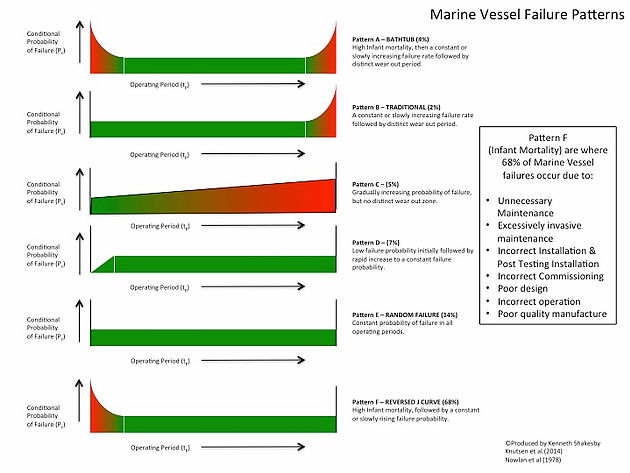Arbitrary Maintenance Increases Equipment Failure
Traditional ship and MODU maintenance practices are centered around scheduled, time-directed maintenance tasks, based on the common belief that the more the equipment is maintained, the more its reliability, availability and lifespan will improve.
?This assumption is not correct, and it is time to reconsider how we maintain our vessels. Most time-based maintenance periods are arbitrary, based on initial OEM recommendations which go unquestioned by the shipowner and remain set throughout the vessel’s lifespan. The OEMs manufacture their products to their highest standards, but it is impossible for them to undertake a full analytical maintenance engineering justification for each and every piece of equipment.
Most marine vessel failures occur due to unnecessary maintenance, excessively invasive maintenance, incorrect installation and post-installation testing, poor design and incorrect operation. ?Paradoxically, the more maintenance we do, an increase in the probability of failure develops due to the introduction of “infant mortality” into the equation.
?A landmark thirty-year study into Reliability Engineering (and in particular the maintenance, repair and overhauls within the aviation industry) produced startling results: the study showed that in spite of long-held beliefs, regular overhaul and maintenance was detrimental to the efficiency and functionality of the aircraft.
?Findings based on actuarial analyses showed 68 percent of failures were indeed random – and more importantly, that regular scheduled maintenance did actually not improve the reliability of equipment and components but rather increased failure rates by introducing infant mortality into what were otherwise stable systems.

This holds true today, possibly more so due to the complexities of modern marine assets. The number of ways that equipment can fail has grown exponentially and is proportionate to the variety and severity of failure consequences. In turn, maintenance costs have risen 10-15 percent per annum since 1979, with total spends estimated around $1 trillion.
One solution, based on seagoing experience and academic research, is our Marine Reliability-Centred Maintenance program, or [m]RCM®. It is a robust, highly defensible engineering risk based maintenance methodology conducted with sound economic judgement; it realizes the inherent safety and reliability of the marine asset, thereby increasing uptime and reducing cost.
How Marine Reliability-Centred Maintenance ([m]RCM®) helps shipowners
[m]RCM® is a program to achieve efficient scheduled maintenance for complex, non-complex equipment and local/global hull structures that is centered on achieving its inherent safety and reliability capabilities at minimal cost. It offers:
- - Greater safety integrity by engineering justification
- - Environmental Integrity (assists with MARPOL/SEEMP compliance)
- - Improved operating performance
- - Greater maintenance cost-effectiveness
- - Reduction in OPEX
- - Reduction of needless maintenance tasks (by 40 to 70 percent)
- - Longer useful life of expensive items
- - A comprehensive database
- - Greater motivation of individuals
- - Better teamwork
- - Improved Operating Procedures
- - An ISO 55000 Compliant program
What [m]RCM® is not:
1) A limited and selective process that picks and chooses the systems and/or the components to analyse such as that found in shortcut and streamlined versions of the process.
2) A process that selectively analyzes only a few given systems or certain components that everyone, including the ship's cook, knows is a problem and has a major effect on the operation of the vessel or facility when it fails.
3) A PM review of what is already being done on system ABC or component XYZ.
4) Converting time directed maintenance tasks into condition directed predictive maintenance tasks.
5) Performing an analysis on a piece part such as a bearing or a shaft.
6) Establishing PM templates for PM tasks.

that matters most
Get the latest maritime news delivered to your inbox daily.
About the Author
Kenneth Shakesby is co-founder and CEO of RELMAR® Ltd, a consultancy which helps owners and operators develop engineering justified, rationalized work packages through an existing CMMS/EAM system.
The opinions expressed herein are the author's and not necessarily those of The Maritime Executive.
